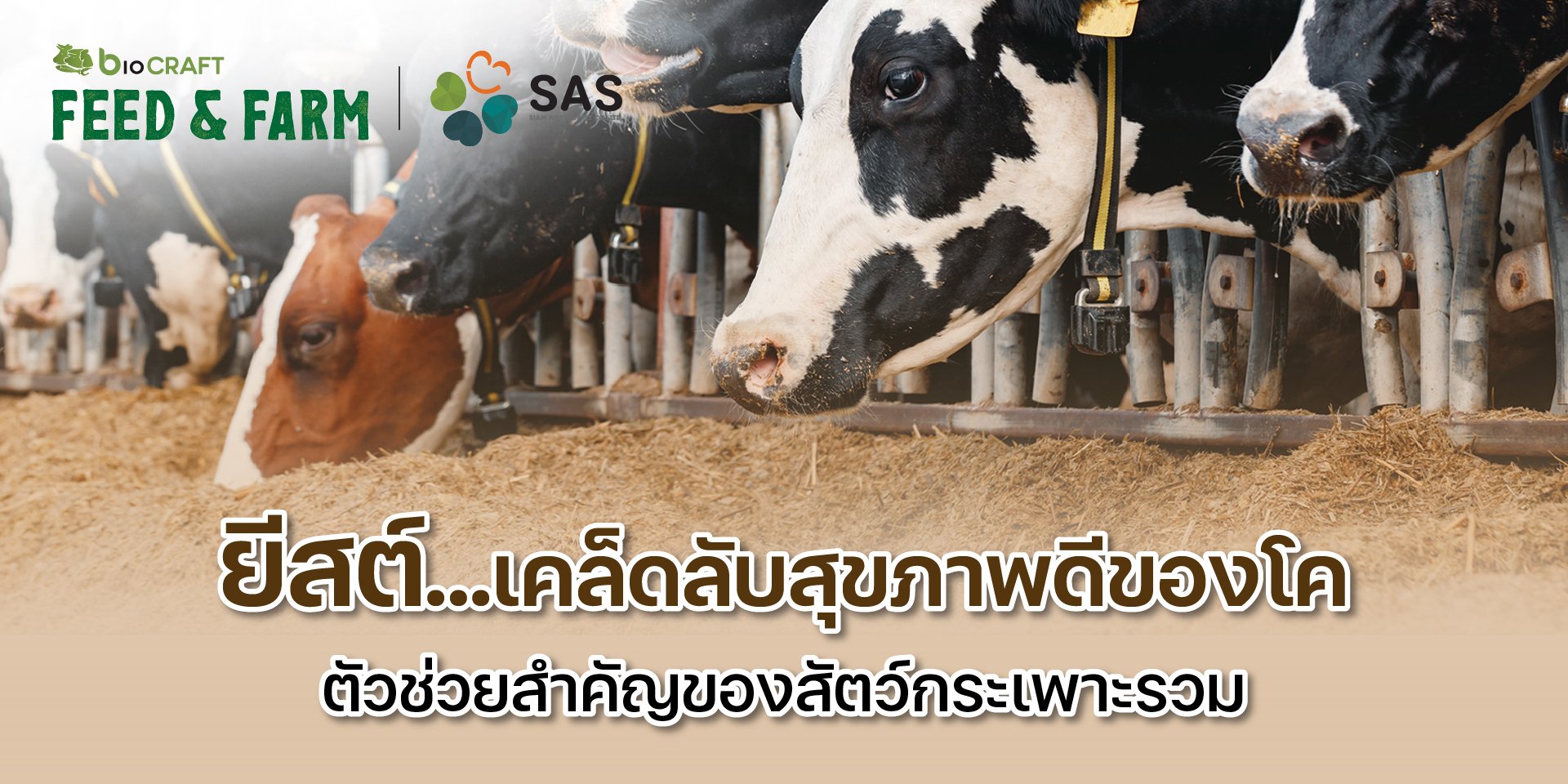The Role of Yeast in the Health and Growth of Ruminant Animals
Last updated: 1 Sept 2025
2168 Views

The Role of Yeast in the Health and Growth of Ruminant Animals
In the livestock industry, yeast has been a long-standing and popular raw material, especially for ruminant animals such as dairy cattle and beef cattle. Farmers often incorporate yeast into their feed through fermentation with raw materials like fermented cassava, fermented corn, or food industry by-products. This practice aims to improve feed quality, enhance digestibility, and promote overall animal health.
What is Yeast?
Yeast is a eukaryotic fungus (Eukaryotic fungi) consisting of various species. It reproduces mainly through budding or fission. Yeast cells are approximately 510 micrometers in diameter.
The most commonly used species in the animal feed industry is Saccharomyces cerevisiae because it grows rapidly and has high nutritional value.
Nutritional Value of Saccharomyces cerevisiae
Several types of yeast are used in the industry, including:
Each type has specific characteristics in terms of nutritional value and production cost. The most common strain used for ruminants is Saccharomyces cerevisiae, which can enhance beneficial microbes in the rumen and help balance digestion.
Benefits of Yeast for Ruminant Animals
Traditionally, yeast was directly fermented with feed materials. Nowadays, farmers are increasingly focusing on safety and precise microbial supplementation by using products in pre-mixed or probiotic forms, which allow better control over quantity and quality.
BioticMax A SAS Product
SAS has developed BioticMax for Ruminants, a high-concentration probiotic containing up to 10¹ CFU/kg, comprising Bacillus spp. and supplemented with Saccharomyces cerevisiae strain yeast. This product is designed to support digestion, bolster immunity, and increase meat and milk production, enabling farmers to raise animals more efficiently and sustainably.
In the livestock industry, yeast has been a long-standing and popular raw material, especially for ruminant animals such as dairy cattle and beef cattle. Farmers often incorporate yeast into their feed through fermentation with raw materials like fermented cassava, fermented corn, or food industry by-products. This practice aims to improve feed quality, enhance digestibility, and promote overall animal health.
What is Yeast?
Yeast is a eukaryotic fungus (Eukaryotic fungi) consisting of various species. It reproduces mainly through budding or fission. Yeast cells are approximately 510 micrometers in diameter.
The most commonly used species in the animal feed industry is Saccharomyces cerevisiae because it grows rapidly and has high nutritional value.
Nutritional Value of Saccharomyces cerevisiae
- Protein: up to 4750% of cell weight, containing essential amino acids, particularly lysine at about 611%
- Carbohydrates: approximately 3035%, mainly glycogen, glucans, and mannan
- Vitamins and minerals: such as B vitamins, which are essential for the animal's metabolic processes
Several types of yeast are used in the industry, including:
- Primary dried yeast
- Active dried yeast
- Brewers dried yeast
- Distillers dried yeast (from grains or molasses)
- Torula yeast
- Yeast culture, etc.
Each type has specific characteristics in terms of nutritional value and production cost. The most common strain used for ruminants is Saccharomyces cerevisiae, which can enhance beneficial microbes in the rumen and help balance digestion.
Benefits of Yeast for Ruminant Animals
- Enhance digestion improves carbohydrate utilization and digestion efficiency
- Stimulate feed intake promotes faster weight gain
- Increase beneficial microbial populations in the rumen such as protozoa that help break down starch more efficiently
- Reduce risks from stomach acidity help maintain pH balance
- Improve productivity in terms of meat quality and milk yield
Traditionally, yeast was directly fermented with feed materials. Nowadays, farmers are increasingly focusing on safety and precise microbial supplementation by using products in pre-mixed or probiotic forms, which allow better control over quantity and quality.
BioticMax A SAS Product
SAS has developed BioticMax for Ruminants, a high-concentration probiotic containing up to 10¹ CFU/kg, comprising Bacillus spp. and supplemented with Saccharomyces cerevisiae strain yeast. This product is designed to support digestion, bolster immunity, and increase meat and milk production, enabling farmers to raise animals more efficiently and sustainably.
Related Content
Memory deterioration, reduced mental clarity, and accelerated brain fatigue more severely than expected
9 Dec 2025
Working-age adults today face constant pressure—tight deadlines, fierce competition, financial struggles, and relationship challenges.
23 Sept 2025


